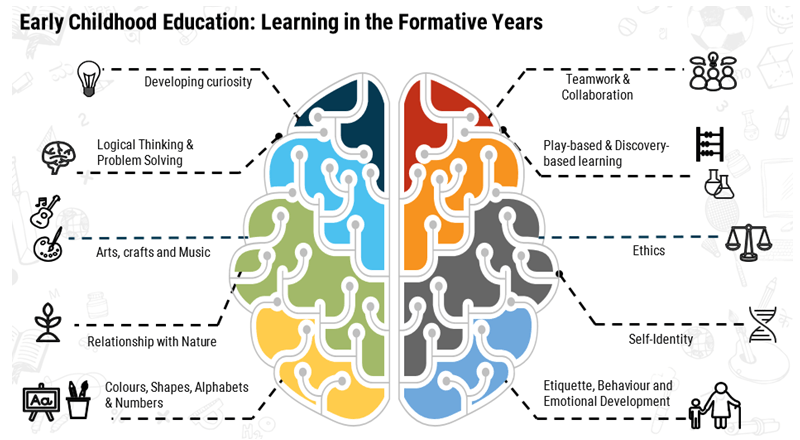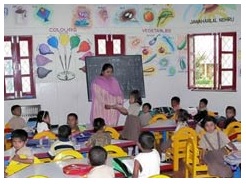
Important features of National Education Policy 2020.
Vision of the National Education Policy 2020
- Develops a deep sense of respect towards the fundamental rights, duties and Constitutional values, bonding with one’s country, and conscious awareness of one’s role and responsibilities in a changing world
- An education system that contributes to an equitable and vibrant knowledge society, by providing high-quality education to all
- Instils skills, values, and dispositions that support responsible commitment to human rights, sustainable development and living, and global well-being, thereby reflecting a truly global citizen.
GET INSTANT HELP FROM EXPERTS!
- Looking for any kind of help on your academic work (essay, assignment, project)?
- Want us to review, proofread or tidy up your work?
- Want a helping hand so that you can focus on the more important tasks?
Hire us as project guide/assistant. Contact us for more information
Key Principlesof NEP
- Respect for Diversity & Local Context: In all curriculum, pedagogy, and policy.
- Emphasize Conceptual Understanding: Rather than rote learning and learning-for-exams
- Equity & Inclusion: As the cornerstone of all educational decisions.
- Unique Capabilities: Recognizing, identifying them in each student.
- Community Participation Encouragement and facilitation for philanthropic, private and community participation.
- Critical thinking and Creativity: To encourage logical decisionmaking and innovation
- Use of Technology: In teaching and learning, removing language barriers, for Divyang students, and in educational planning and management.
- Continuous Review: Based on sustained research and regular assessment by educational experts.
Universal Access to Early Childhood Care & Education (ECCE)
- Foundational Learning Curriculum: For age group of 3-8 divided in two parts: (i) From age 3-6 in ECCE and (ii) age 6 to 8 in class I and II in primary school
- Preparatory Class: Prior to the age of 5 every child will move to a “Preparatory Class” or “Balvatika” (that is, before Class 1)
- Universal Access: For children of 3-6 years: access to free, safe, high-quality ECCE at Anganwadis/Pre-school/Balvatika
- Multifaceted: Flexible, multi-level, play-based, activity-based, and inquiry-based learning
Implementation to be jointly carried out by Ministries of HRD, Women and Child Development (WCD), Health and Family Welfare (HFW), and Tribal Affairs.
Ensuring Universal Access to Education at all levels
- Multiple Pathways: Multiple pathways to learning; involving both formal and non-formal education modes
- Build Schools: Promoting both governments and non-governmental philanthropic organizations to build schools
- Learning Outcomes: Focus will be on achieving desired learning outcomes at all levels
- Bring Back Drop-outs: To bring drop out children back to school
- Alternative Centers: Alternative and innovative education centers
- Peer Tutoring: Suitable for all categories business and personal presentation
Expected Outcomes
- Universalisation of Access – from ECCE to Secondary
- Ensure equity and inclusion
- Bring back 2 crores out-of-school children
- Attain SDG goals of retaining all children in schools until completion of secondary education
- Improve Quality and achievement of learning outcomes – Foundational Literacy & Numeracy (FLN)
- Focus on21st century skills in teaching, learning and assessment
- Resource sharing- School complexes
- Effective Governance -separation of powers and common norms
- Overcoming the language barrier in learning
- Common standards for public and private school education
Transforming Curricular & Pedagogical Structure
New pedagogical and curricular structure of school education (5+3+3+4): 3 years in Anganwadi/pre-school and 12 years in school.
- Secondary Stage(4)multidisciplinary study, greater critical thinking, flexibility and student choice of subjects
- Middle Stage (3) experiential learning in the sciences, mathematics, arts, social sciences, and humanities
- Preparatory Stage (3) play, discovery, and activity-based and interactive classroom learning
- Foundational stage (5)multilevel, play/activity-based learning
ECCE Framework
- NCPFECE: National Curricular and Pedagogical Framework for Early Childhood Education (NCPFECE) will be drafted by NCERT
- Multi-faceted Framework: Comprising of alphabets, languages, numbers, counting, colours, shapes, indoor and outdoor play, puzzles and logical thinking, problem-solving, drawing, painting and other visual art, craft, drama and puppetry, music and movement
- Research and Best Practices: NCPFECE will be aligned with the latest research on ECCE, and national and international best practices
- School Preparation Module: A 3-month play-based ‘school preparation module’ for all Grade 1 students to be developed by NCERT
Reduction in Curriculum
- Core Essential: Curriculum in all subjects to be reduced to its core essentials
- Critical thinking: Focus on critical thinking, inquiry, discovery, discussion and analysis based teaching and learning methods for holistic education
- Interactive classes: Interactive teaching with reduced dependency on textbook learning; Questions from students will be promoted
- Experiential Learning: Fun, creative, collaborative, and exploratory activities in classroom for experiential learning and deeper student learning
Curriculum and pedagogy to be transformed by 2022 to promote skill-based and minimize rote based learning.
Focus on LOs, Competencies and subject -integration
- Competency based education: Modules on preparing and implementing pedagogical plans based on competency and outcome-based education for school leaders
- Integration of subjects: Through arts integrated, sports integrated, ICT integrated and storytelling based pedagogy among others as standard pedagogy
- Development of scientific temper: Development of scientific temper and inculcation of knowledge and practice of human and constitutional values such as patriotism, sacrifice, non-violence, truth, honesty, peace etc.
- NO SILOS among subjects/learning: NO hard separation between: curricular/co-curricular/extra-curricular; academic/vocational; science/humanities; sports/art/academics
- Emphasis on digital literacy, coding and computational thinking, ethical and moral reasoning Promotion of multi-lingual teaching: Promoting states to enter into bilateral agreements with nearby states to hire language teachers
India’s future and India’s leadership role in upcoming fields
- Computational thinking: Increased emphasis on mathematics and computational thinking throughout the school years. Activities involving coding will be introduced in Middle Stage
- Mathematical thinking and problem solving: Inculcate mathematical thinking and problem solving through a variety of innovative methods, including the regular use of puzzles and games.
- Including contemporary subjects in schools: Teaching of contemporary subjects at middle and secondary stages: Artificial Intelligence, Design Thinking, Holistic Health, Organic Living, Environmental Education, Global Citizenship Education (GCED).
Knowledge of India
- Video documentaries on inspirational luminaries of India, in science and beyond.
- Students will be given a logical framework for making ethical decisions at a young age.
- In later years, expanded along themes of cheating, violence, plagiarism, littering, tolerance, equality, empathy.
- Traditional Indian values and all basic human and Constitutional values will be developed in all students.
- Excerpts from the Indian Constitution will also be considered essential reading for all students.
- Basic training in health, mental health, good nutrition, personal and public hygiene, disaster response and first-aid will also be included.
- Will be incorporated in an accurate and scientific manner wherever relevant.
- Indian Knowledge Systems, including tribal knowledge and indigenous and traditional ways of learning, will be covered.
- Specific courses in tribal ethno-medicinal practices, forest management, traditional (organic) crop cultivation, natural farming, etc. will also be made available.
- Curriculum to include knowledge from ancient India to modern India as well as future aspirations.
- Scientific explanations of the detrimental and damaging effects of alcohol, tobacco, and other drugs will be part of curriculum.
Is Primary Education in India Up to the Mark?
GET INSTANT HELP FROM EXPERTS!
- Looking for any kind of help on your academic work (essay, assignment, project)?
- Want us to review, proofread or tidy up your work?
- Want a helping hand so that you can focus on the more important tasks?
Hire us as project guide/assistant. Contact us for more information

Experts are raising alarms looking at the primary education system in out country. And though there are many who acknowledge that the system is broken, there’s hardly any steps taken to address the problem.
While the current policy, including a new legislation for universal education, lays out a grand vision of raising children’s education profile, it barely lays emphasis on developing their skills to learn.
The Programme for International Student Assessment (PISA) ranks India almost at the bottom of the pack in terms of maths and English literacy. This, according to its test, is attributed to the “lack of application-oriented maths in schools”. However, the PISA test was conducted in only two states in India and theoretically cannot be extrapolated to the rest of the country. It could also be that local students find the test patterns difficult to understand.
Nevertheless, Dana Kelly, US representative on PISA’s governing board, says the test helps identify variation in performance and the resources available. “In developing economies such as India, the lack of investment in facilities and educational resources could be a reason for the low performance,” says Kelly.
And how about the skills of teachers?
Over 99 percent of the 7.95 lakh teachers who appeared for the latest Central Teacher Eligibility Test, a benchmark for teacher eligibility, failed to clear the exam. This is largely due to the outdated B.Ed degree system. An NCERT paper says the B.Ed programme is too short and focuses on “rote memorization” rather than “teaching for understanding”.
And even though the National Curriculum Framework for Teacher Education of 2009 recommended longer preparation for teachers, the B.Ed curriculum structure continued to be for a single year. There is also a lack of enough skilled trainers and preparation to develop skills, abilities and attitudes to teach students.
There’s no doubt that the quality of primary education in India has been a cause for concern for quite some time. Unless the education system is overhauled, these young ones would grow to join the swelling ranks of the ‘educated unemployables’ in our country.
GET INSTANT HELP FROM EXPERTS!
- Looking for any kind of help on your academic work (essay, assignment, project)?
- Want us to review, proofread or tidy up your work?
- Want a helping hand so that you can focus on the more important tasks?
StudyMumbai.com is an educational resource for students, parents, and teachers, with special focus on Mumbai. Our staff includes educators with several years of experience. Our mission is to simplify learning and to provide free education. Read more about us.

Leave a Reply
You must be logged in to post a comment.